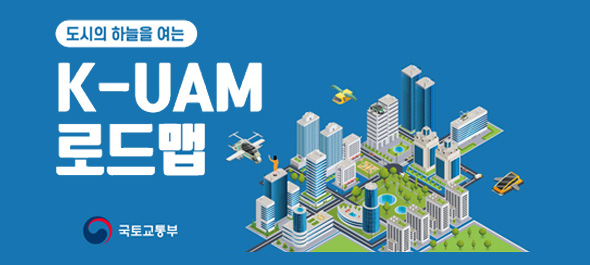|
Check out the latest smart city policy information!
No. 6 (2020.06.29.)
Issue of the Month Dreaming of a smart city! Smart City!! 20.06.24. / KBS Daejeon
Cities around the world are jumping into smart city construction with the wind of the 4th industrial revolution. Creating a more convenient and pleasant city through science and technology is a flow that transcends borders. Each country has a different aspect of technology development, but has one thing in common. The goal of building a smart city is to provide a pleasant and safe environment for people.
Efforts are also being made in Korea to solve problems arising in transportation, environment, and housing using information and communication technology. Let's look at these efforts through Sejong City, a national pilot smart city.
Sejong City aims to create a safer city by monitoring the state of the city through the integrated urban information center, and to provide a more convenient environment through autonomous vehicles. In addition, it provides city services incorporating various technologies, such as LED safety lights for pedestrian crossings and Sejong Automatic Clean Net that solves urban waste problems.
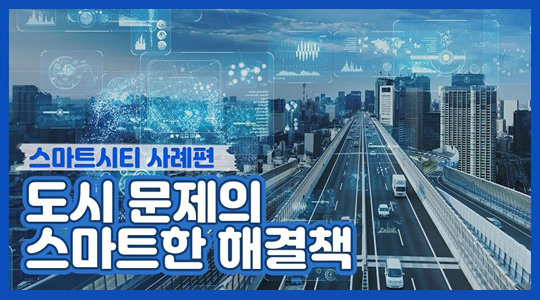 <Smart City Case Study>
Smart solution to urban problems 20.06.05. / KDI Economic Information Center
While responding to the problems of rapid urbanization, countries around the world are promoting smart cities as a new model for creating sustainable cities. Each country's implementation method differs depending on the growth stage and conditions of the city, but it is a common feature that citizens are using the technologies of the Fourth Industrial Revolution to develop services that involve citizens.
Finland Helsinki provides'whim service', an artificial intelligence app where all transportation information is shared, and Singapore is using real-time big data for urban planning by promoting the'Virtual Singapore Project' that implements the entire country into virtual reality. , China Hangzhou, in collaboration with Alibaba, is implementing a'paperless society' that applies blockchain technology to IoT and electronic wallets.
In the case of Korea, future smart cities that combine various advanced technologies are being created in Sejong and Busan.
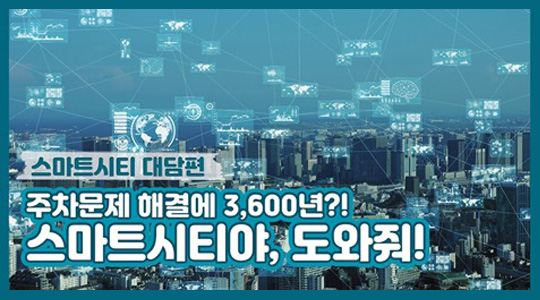 <Smart City Talk>
Smart City, help! 20.06.05. / KDI Economic Information Center
The Korean Wave is now becoming a culture beyond the sparkling trend. But recently, K-Smart City is on the rise. K-Smart City refers to a Korean smart city model that combines urban construction, ICT solutions, and legal systems in a package type. K-Smart City is characterized by being able to provide customized support for each type of overseas expansion target, and being used as a major channel for exchange and cooperation.
In the process of constructing U-city and smart city, Korea is characterized by a natural industrial ecosystem. The industry-academia-research network was created in the process of self-development of smart city element technologies or solutions required for new cities without procuring them from abroad. It should be noted that the industrial ecosystem built by self-developing solutions or systems necessary for Korean smart cities is also effective in solving problems in underdeveloped and developing countries.
Smart City Special
2025년, No traffic jamUrban Sky Road' Opens 20.06.02./ MOLIT
On June 6, at the 4nd Innovation Growth Strategy Meeting, the government confirmed the 「Korean Urban Air Mobility (K-UAM) Roadmap」 with the main content of starting commercial service in 2 of UAM (Urban Air Mobility), a next-generation mobility that will enable sky commuting.·Announced.
The main contents of promotion are as follows.
1. Establish a rational system to ensure safety Public-private joint demonstration project (K-UAM Grand Challenge, K-UAM Grand Challenge, etc.) to prepare Korean-style operation standards suitable for domestic conditions such as communication environment, weather conditions, and social acceptance of noise. '22 ~'24).
2. Creating an environment to secure and reinforce private competency Before commercialization of urban air traffic ('25), test·Designated special liberalized zones in accordance with the Drone Act so that they can fly without regulation during the demonstration·It will be operated.
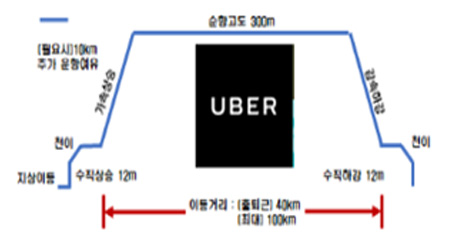 [Conceptual map of Uber's operation standards]
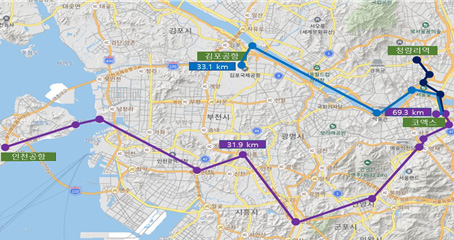 [Proof route for metropolitan area (plan)]
3. Realization of step-by-step services to expand public acceptance The K drone system, which is a transportation management system, is verified and safety is verified through cargo transportation, and cargo transportation services are implemented first.
4. Building infrastructure and connected transportation for convenience Procurement of private capital to build an urban air traffic terminal (Vertiport) that requires large capital·Prioritize construction.
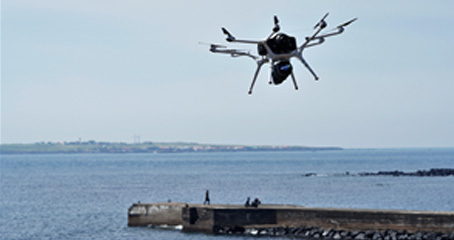 [Use of drones for cargo (delivery masks between Jeju and Gapado)]
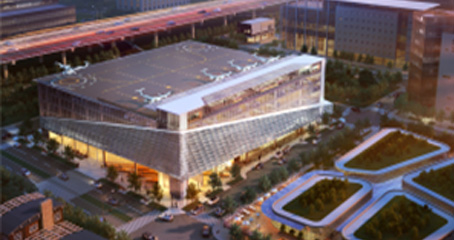 [Uber's Initiative Vertiport]
5. Process·Creating a sustainable and healthy industrial ecosystem Considering the urban air traffic service area (in the city center) and the operating distance (30 to 50 km), urban air traffic transport business operators will establish a transport business system similar to the existing air transport business system for buses and taxis ('23).
6. Expanding international cooperation alongside global standards Agreement with the US Federal Aviation Administration (FAA) and European Aviation Safety Administration (EASA), major airworthiness authorities leading international standards in the aviation sector·Expand contracts and promote the establishment of constant cooperation channels ('20~).
When urban air traffic is realized, the boundary between cities and towns is broken through innovative shortening of travel time, and the network of people and groups is expected to be improved through efficient use of time.
Smart City Policy Project
soupTobu, New competition for national pilot smart city innovation technology activation project 20.06.25./ MOLIT
As the smart city-type regulatory sandbox system was implemented in earnest from February this year, the Ministry of Land, Infrastructure, and Transport Implement a new project to revitalize the regulatory deferral system* (hereinafter referred to as regulatory sandbox) within the smart city national model cities (Sejong, Busan)Said.
*(Deferral System) A system that gives special cases for new products and services using new technologies to allow market launch, testing and verification by delaying the current regulations under certain conditions (period, place, scale)
This project is a project that comprehensively supports regulatory special cases and test project expenses so that private companies can demonstrate innovative services planned to be introduced in national model cities (Sejong and Busan) without regulatory restrictions and link them to the project. This competition is conducted in two ways: designated competition and free competition in order to discover tasks that are highly connected to the service of the pilot city and have a great effect on improving regulations.
Companies with creative ideas and innovative technologies in the public offering project can participate in various forms, such as single or allied (consortium), and the submitted tasks are subject to a limited amount of regulatory exemptions through the regulatory sandbox system if the need is recognized after regulatory review (4 Within a year, it can be extended once).
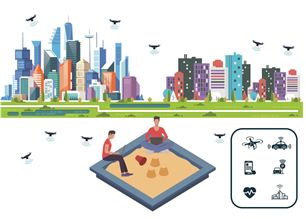 Ministry of Land, Infrastructure, and Transport said that it intends to create an experimental space where future new industries can be freely implemented by promoting regulatory sandbox activation within the national pilot city, which is a leading model of smart city, and challenging and creative companies are actively engaged with innovative new technologies and services. He said he expects to participate. Smart City Policy Trend 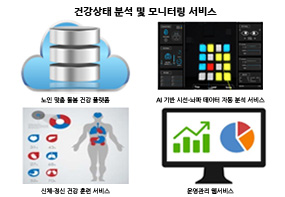 Busan city spreads VR smart devices to prevent dementia 20.06.19. / Busan City
Busan City announced that it was selected as a consortium of Pusan National University Hospital, Looxid Labs Co., Ltd., and Com, and SY Innotek Co., Ltd. for the 2020 Internet of Things Product/Service Verification and Expansion Project New Project Contest promoted by the National IT Industry Promotion Agency, 'Expansion of customized care health kit service for the elderly using AIoT brainwave and eye-tracking analysis technology' was selected, secured 9 million won from the government, and signed a business agreement on June 6. .
By developing and upgrading dementia prevention cognitive and rehabilitation service that combines IoT sensor and virtual reality (VR) technology, a platform is provided in the Dementia Relief Center and the Elderly Welfare Center to provide services to prevent cognitive ability and dementia in the elderly. Is expected.
The city of Busan will support 30 testbeds, such as the Dementia Relief Center and the Elderly Welfare Center, and invest a budget of 8 million won.
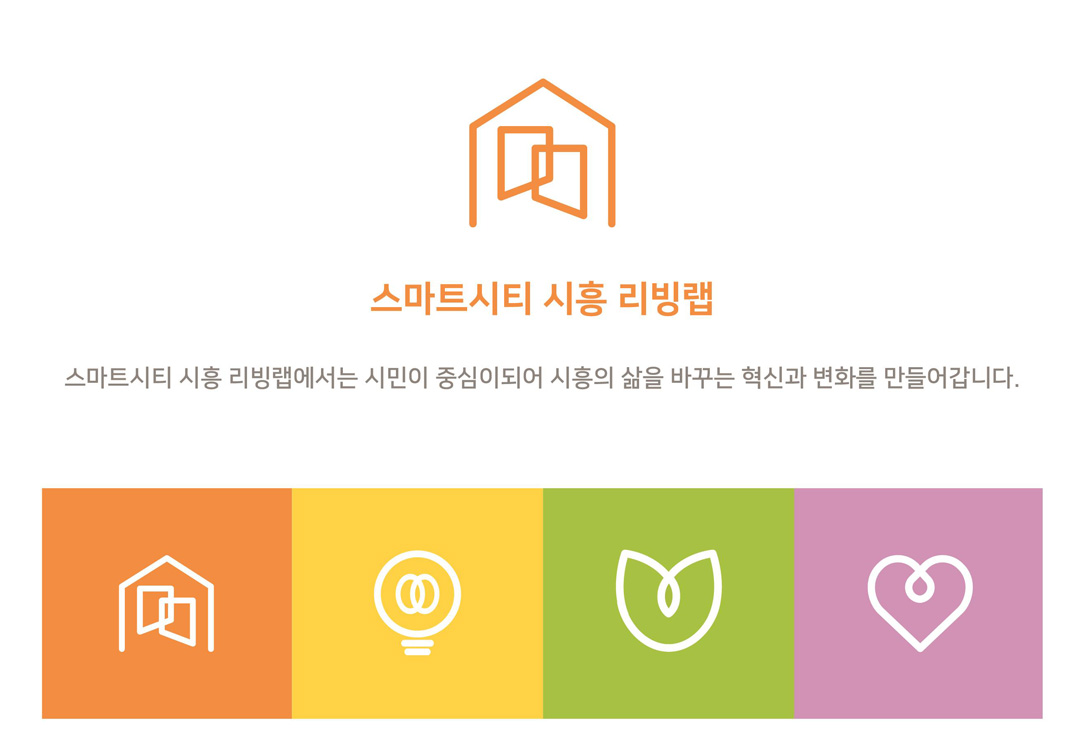 Siheung City,'Smart City Siheung Living Lab' in full swing 20.06.17. / Siheung City
Siheung-si, Gyeonggi-do, promotes'Smart City Siheung Living Lab' in earnest to create innovation and change that changes the life of Siheung as the center of citizens. On May 5, the city started team activities for each project to analyze the problem situation and derive solution idea directions to solve urban problems in Siheung City with the members of the <Smart City Siheung Living Lab> project team. We will continue to do so. The team activities for each project are a smart farm using loT technology, a communication support service for multicultural students, a village safety map creation, a service to solve parking problems in Siheung City, and a response system in case of a toxic transport vehicle accident.
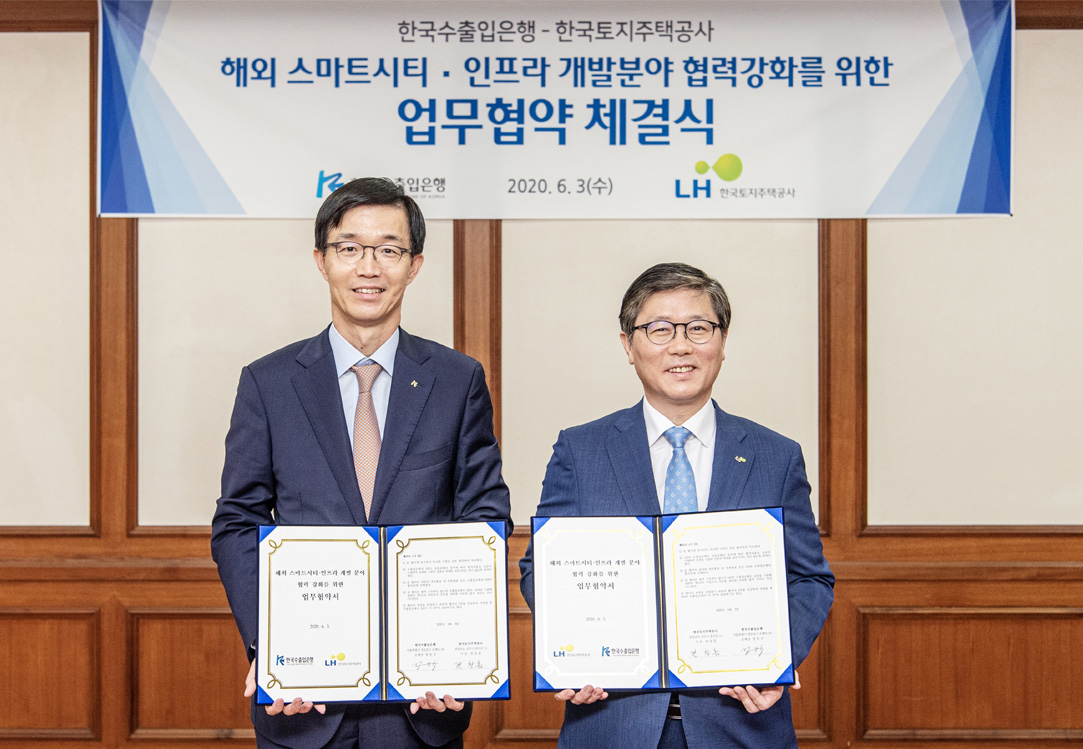 LH-Korea Export-Import Bank meets to expand overseas smart city exports 20.06.03. / Korea Land and Housing Corporation
LH announced on the 3rd that it has signed a business agreement (MOU) with the Korea Export-Import Bank at the head office of Yeouido in Mercury, and will cooperate with each other to advance into the smart city and infrastructure development business. This business agreement is aimed at expanding cooperation between overseas businesses in the'Smart City' field, one of the eight leading projects of the government's innovative growth, supporting orders from public institutions to expand domestic companies' overseas development projects, and expanding cooperation between LH and mercury. It was concluded to discover new overseas development projects.
In accordance with the agreement, the two organizations will include reviewing the organic linkage plan of public development assistance projects and investment development projects for overseas smart city and infrastructure development projects, utilization of mercury finance to vitalize investment development projects, discovery of promising overseas projects, and development cooperation. It was decided to establish a comprehensive cooperation system.
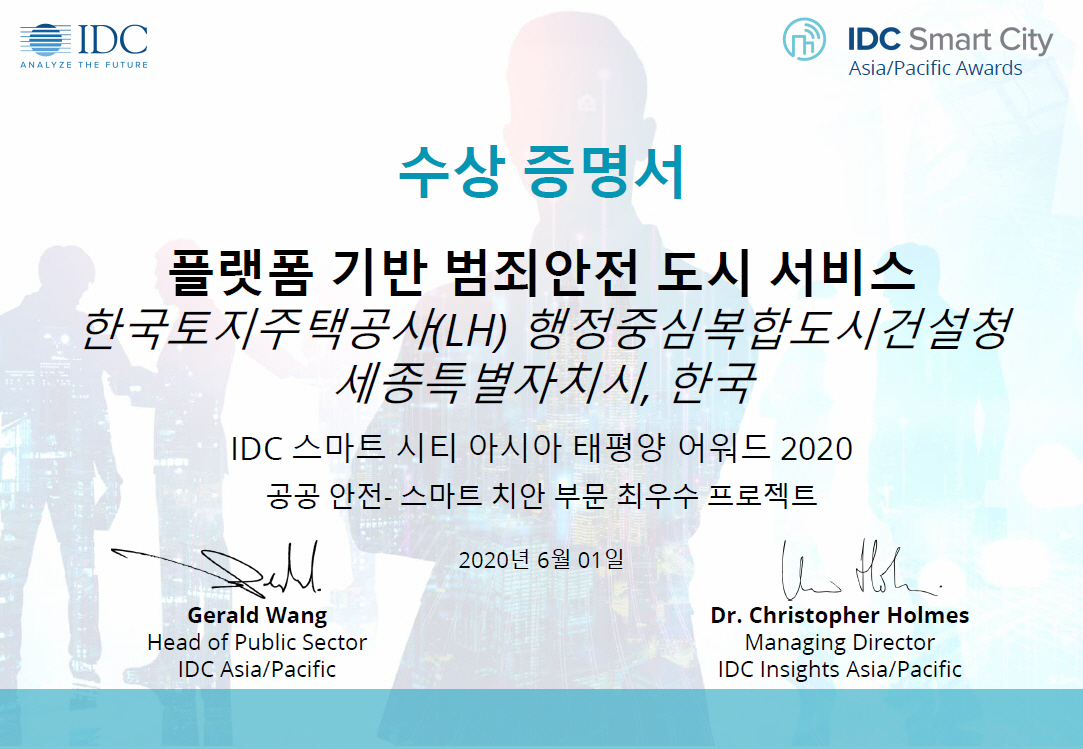 Sejong City selected as the best city in the Asia Pacific region for smart security 20.06.08. / Sejong City
Sejong Special Self-governing City was selected as the best city in public safety and smart security at the '2020 Smart City Asia/Pacific Awards' hosted by IDC, the world's leading IT market analysis and consulting organization.
*2020 Smart City Asia/Pacific Awards: An international event in the smart city field that selects excellent governments, public institutions, and private companies from 14 smart city eService areas categorized by function.
The city attracted attention by presenting'Smart Sejong Platform-Based Crime-Safe City Service', which is co-promoted by NAACC and LH in the Public Safety-Smart Security Division.
With this award, the city was recognized for contributing to promoting the safety and innovation of the platform-based crime safety service using the Internet of Things (IoT), big data, and artificial intelligence (AI) technologies.
Smart City Literature
smartcity@auri.re.kr / 044-417-9668
|






